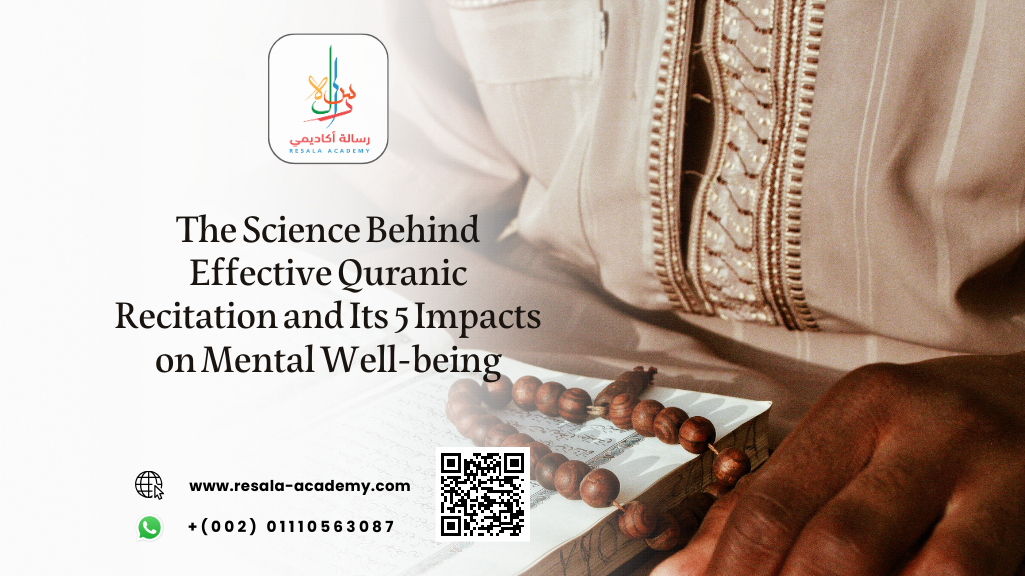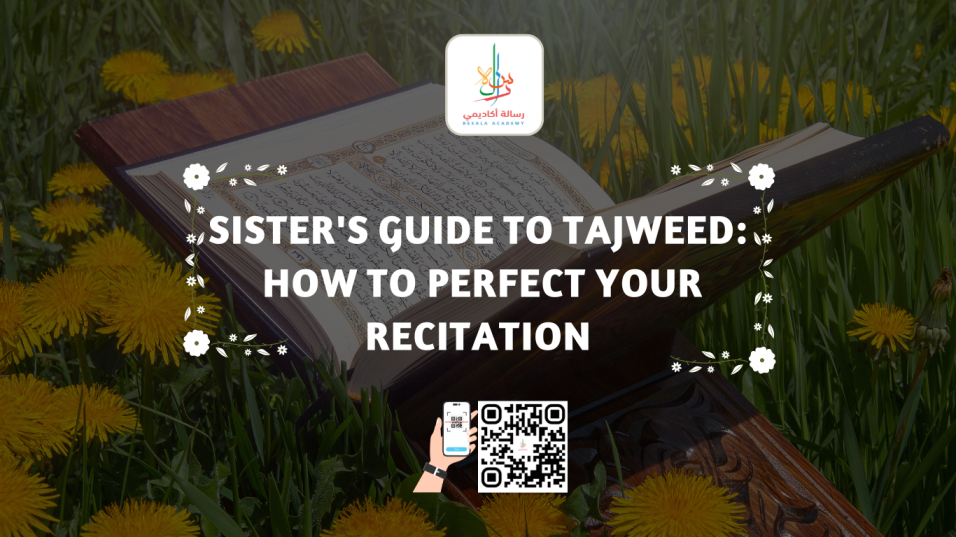Table of Contents
The Science Behind Effective Quranic Recitation and Its 5 Impacts on Mental Well-being
The power of sound has long been recognized as a tool for relaxation, focus, and healing. From soothing melodies to rhythmic chants, the impact of sound on our mental well-being is undeniable. And when it comes to Quranic recitation, the effects are even more profound.
Quranic recitation holds a special place in the hearts and minds of Muslims around the world. It is not just about reading or memorizing verses; it goes beyond that. The art of reciting the Quran involves understanding its meaning, mastering pronunciation and intonation, and connecting with the divine message on a deeper level.
In this blog post, we will explore the science behind effective Quranic recitation and its remarkable impact on mental well-being.
We will delve into how sound affects the brain, discuss the psychological benefits of Quranic recitation, highlight the importance of pronunciation and intonation, explore different methods and practices for effective recitation, and introduce you to Resala Academy’s online Quranic Recitation Course. So sit back, relax, and let’s embark on this enlightening journey together!
The Importance of Quranic Recitation
– Quranic recitation is not merely a religious practice; it holds immense significance in the lives of Muslims and serves as a means of connecting with their faith.
– Reciting the Quran brings about a sense of tranquility, serenity, and spiritual fulfillment. It allows individuals to establish a deeper connection with Allah and seek solace in times of hardship or distress.
– Quranic recitation promotes mindfulness by encouraging individuals to focus their attention on the words being spoken. This helps in clearing the mind from distractions and fostering a state of calmness and inner peace.
– The act of reciting the Quran also aids in memorization. By repeatedly reading aloud the verses, individuals can commit them to memory more effectively, allowing for easier access to divine teachings whenever needed.
– Additionally, Quranic recitation is seen as an act of worship that earns immense rewards from Allah. It is considered one of the most virtuous acts that can be performed by Muslims.
Quranic recitation plays a pivotal role in spiritual growth and mental well-being for millions around the world. Its importance goes beyond mere religious rituals; it serves as a source of comfort, guidance, and enlightenment.
By engaging with these sacred verses through heartfelt recitation, individuals can experience profound benefits for their overall mental health and well-being without compromising on their faith.
The Power of Sound and its Effects on the Brain
Sound is a powerful force that can impact our emotions, thoughts, and even physical well-being. When it comes to Quranic recitation, the power of sound takes on a whole new level of significance. The rhythmic patterns and melodic tones in the recitation of the Quran have profound effects on our brains.
Sound has been found to stimulate various areas in the brain associated with memory and emotion. Listening to Quranic recitation activates these regions, leading to improved concentration and focus. The repetition of verses helps reinforce neural pathways, making it easier for us to retain information.
Studies have shown that certain frequencies and rhythms can induce a state of relaxation or calmness in individuals. Reciting or listening to verses from the Quran can help reduce stress levels by promoting feelings of tranquility and peace. This can be particularly beneficial for those struggling with anxiety or depression.
Furthermore, research has demonstrated that exposure to harmonious sounds can boost cognitive function and enhance creativity. The intricate melodies in Quranic recitation engage both hemispheres of the brain, facilitating better communication between them. This synchronization promotes mental clarity and enhances problem-solving abilities.
In addition to its cognitive benefits, Quranic recitation also affects our emotional well-being. The uplifting nature of the verses generates positive emotions such as gratitude, awe, and hope within us. These emotions play an essential role in nurturing resilience and fostering a sense of purpose in life.
Lastly, yet importantly, sound therapy using specific frequencies has gained popularity as an effective method for treating various neurological disorders like Alzheimer’s disease or attention deficit hyperactivity disorder (ADHD). Similarly, quranic recitations aid not only spiritual development but also provide therapeutic benefits for mental health conditions.
The Psychological Benefits of Quranic Recitation
The Psychological Benefits of Quranic Recitation:
1. Stress Reduction:
Quranic recitation has been found to have a calming effect on the mind and body, helping to reduce stress and anxiety levels. The rhythmic nature of reciting verses can induce a state of relaxation, leading to improved mental well-being.
2. Increased Focus and Concentration:
Regular practice of Quranic recitation requires attentiveness and focus. This helps in training the mind to stay present in the moment and enhances concentration skills. As a result, individuals may experience improved productivity and better cognitive abilities.
3. Emotional Healing:
Reciting verses from the Quran can provide solace during times of emotional distress or grief. It offers comfort, hope, and guidance, allowing individuals to find inner peace amidst challenging circumstances.
4. Positive Affirmation:
The act of reciting meaningful verses from the Quran can serve as a positive affirmations for oneself. The repetition of uplifting words fosters a sense of self-belief, confidence, and motivation – promoting a positive mindset overall.
5. Spiritual Connection:
Engaging with the sacred text through recitation creates an intimate connection between an individual’s soul and their Creator. This spiritual bond brings about a sense of tranquility, contentment, and purpose in life.
The Role of Pronunciation and Intonation in Effective Quranic Recitation
Pronunciation and intonation play a crucial role in effective Quranic recitation. The way we pronounce the words and phrases of the Quran can significantly impact our understanding and connection to its message. Here’s why:
1. Accurate pronunciation:
Properly pronouncing each letter, word, and verse is essential for conveying the intended meaning of the text. The Arabic language has specific phonetic sounds that must be pronounced correctly to maintain the integrity of the scripture.
2. Enhancing comprehension:
By focusing on accurate pronunciation, reciters can better grasp the nuances and subtleties embedded within each verse. Understanding these intricacies deepens their connection with Allah’s message.
3. Emotional resonance:
The beauty of Quranic verses lies not only in their meanings but also in how they are melodiously recited. Correct intonation helps evoke emotions such as awe, tranquility, or gratitude while reflecting on these divine words.
4. Spiritual upliftment:
When we pay attention to pronunciation and intonation during recitation, it becomes a mindful practice that transports us into a state of presence and spiritual elevation. This attentiveness allows us to fully absorb Allah’s guidance.
5. Strengthening memorization:
Proper enunciation aids memorization efforts by creating distinct auditory markers for different verses or sections of the Quran.
By emphasizing correct pronunciation and intonation, we can enhance our relationship with both the content and spirit of this holy book.
The Methods and Practices of Effective Quranic Recitation
1. Mindful Preparation:
Before starting the recitation, it is important to prepare yourself mentally and spiritually. Find a quiet and clean space where you can focus without distractions. Begin by seeking refuge in Allah from any negative influences or distractions.
2. Proper Pronunciation:
One of the key aspects of effective Quranic recitation is correct pronunciation. Each word has its unique sound, so make sure to learn the proper pronunciation from a qualified teacher or through reliable online resources.
3. Tajweed Rules:
Tajweed refers to the rules that govern the way each letter should be pronounced in Quranic recitation. Learning these rules will help you maintain clarity and beauty in your recitation.
4. Understanding Arabic Grammar:
To truly connect with the words of Allah, it is beneficial to have a basic understanding of Arabic grammar and syntax. This will allow you to grasp the meanings behind verses more deeply.
5. Reciting with Intention:
Approach your recitation with sincerity and intentionality. Understand that every word holds immense power and significance, so strive to recite with humility, reverence, and gratitude for being able to engage directly with Allah’s words.
Resala Academy Offers an Online Quranic Recitation Course
Resala Academy, a leading online learning platform, is proud to offer an innovative and comprehensive Quranic Recitation course. To provide accessible and convenient education for individuals seeking to improve their recitation skills, Resala Academy has designed this course to cater to learners from all backgrounds.
In this online Quranic Recitation course, students will have the opportunity to learn from experienced instructors who are well-versed in the rules of Tajweed (pronunciation) and Tarteel (intonation). The course curriculum covers various aspects of effective recitation including proper pronunciation of Arabic letters, understanding the rules of elongation, mastering different types of pauses, and developing a rhythmic flow while reciting verses from the Holy Quran.
The course is divided into interactive modules that include video lessons, audio exercises, quizzes, and practical assignments. Students will also benefit from personalized feedback and guidance from their instructors throughout the course. This ensures that they can track their progress and make improvements as they advance through each module.
One notable feature of Resala Academy’s Online Quranic Recitation Course is its flexibility. Students can access the course materials at any time that suits them best. Whether you’re a busy professional or a student with limited free time during your day-to-day routine, this self-paced learning format allows you to study at your convenience without compromising on quality education.
Enrolling in Resala Academy’s Online Quranic Recitation Course not only provides an opportunity for personal growth but also serves as a means to connect with fellow learners who share similar goals. Through discussion forums and virtual classrooms facilitated by expert instructors, students can engage in meaningful conversations about their experiences with recitation techniques or seek clarification on specific topics related to Tajweed principles.
Join Resala Academy today for an enriching journey towards enhancing your Quranic recitation skills! Experience firsthand how this transformative online program can help deepen your spiritual connection while improving your fluency and understanding of the divine words of the Quran.
FAQs
1. Is it necessary to recite the Quran in Arabic?
Yes, it is highly recommended to recite the Quran in its original language, which is Arabic. The beauty and power of the Quran lie in its precise words and eloquent verses that can only be fully appreciated when recited in Arabic. However, for those who are not fluent in Arabic or find it difficult to understand, translations are available to help them comprehend the meaning of the verses.
2. Can I recite the Quran without understanding its meaning?
While it is beneficial to understand and reflect upon the meanings of the Quranic verses, reciting them even without understanding can still have a profound impact on your mental well-being. The rhythmic sound patterns and melodic tones created during recitation have a calming effect on our minds and hearts, bringing about inner peace and tranquility.
3. How long should I spend on Quranic recitation daily?
There is no fixed duration for Quranic recitation; it depends on individual preferences and schedules. Some people may choose to dedicate a specific time each day for extended periods of reading or memorization sessions, while others may prefer shorter but more frequent sessions throughout their day.
4. What if I struggle with pronunciation during Quranic recitation?
Pronunciation plays an important role in effective Quranic recitation as proper enunciation enhances clarity and understanding of the text. If you struggle with pronunciation, consider seeking guidance from knowledgeable individuals or enrolling in courses specifically designed to improve Tajweed (rules of correct pronunciation) skills.
5. Can children benefit from engaging in regular Quranic Recitation?
Absolutely! Engaging children early on with simple Surahs (chapters) from the Quran helps develop their love for Allah’s words while nurturing their cognitive abilities through memorization techniques.
Conclusion
Quranic recitation is not just a religious practice but also a powerful tool for promoting mental well-being. The importance of Quranic recitation cannot be overstated, as it has been an integral part of Islamic tradition for centuries. Through its rhythmic and melodic tones, the power of sound affects our brains in profound ways, inducing relaxation and reducing stress levels.
The psychological benefits of Quranic recitation are numerous. It can help alleviate anxiety and depression by providing a sense of tranquility and peace. The repetition of verses during recitation helps to focus the mind, improving concentration and mindfulness. Additionally, the emotional connection formed through the recitation can foster a greater sense of spirituality and inner fulfillment.
Pronunciation and intonation play a crucial role in effective Quranic recitation. Paying attention to proper pronunciation ensures that each word is pronounced correctly with its intended meaning intact. Meanwhile, using appropriate intonation adds depth to one’s delivery, capturing the essence and emotion behind each verse.
To achieve effective Quranic recitation, certain methods and practices should be followed. These include understanding Tajweed rules (the rules about correct pronunciation), practicing regularly with guidance from experienced teachers or scholars, listening to professional recordings for inspiration, memorizing verses for better comprehension during recitation sessions, and utilizing different speeds while reading to enhance fluency skills.
For those interested in enhancing their Quranic recitation skills or starting their journey as beginners, Resala Academy offers an online course dedicated solely to mastering this art form.
The course provides comprehensive lessons on Tajweed rules along with expert guidance from qualified instructors who have years of experience in teaching students from all backgrounds.
So whether you’re looking to deepen your spiritual connection or seeking solace in times of distress, Quranic Recitation holds immense potential for improving mental well-being.
Simply immerse yourself into this sacred practice, enjoy its soothing melodies, and let it transform both your mind and soul.




